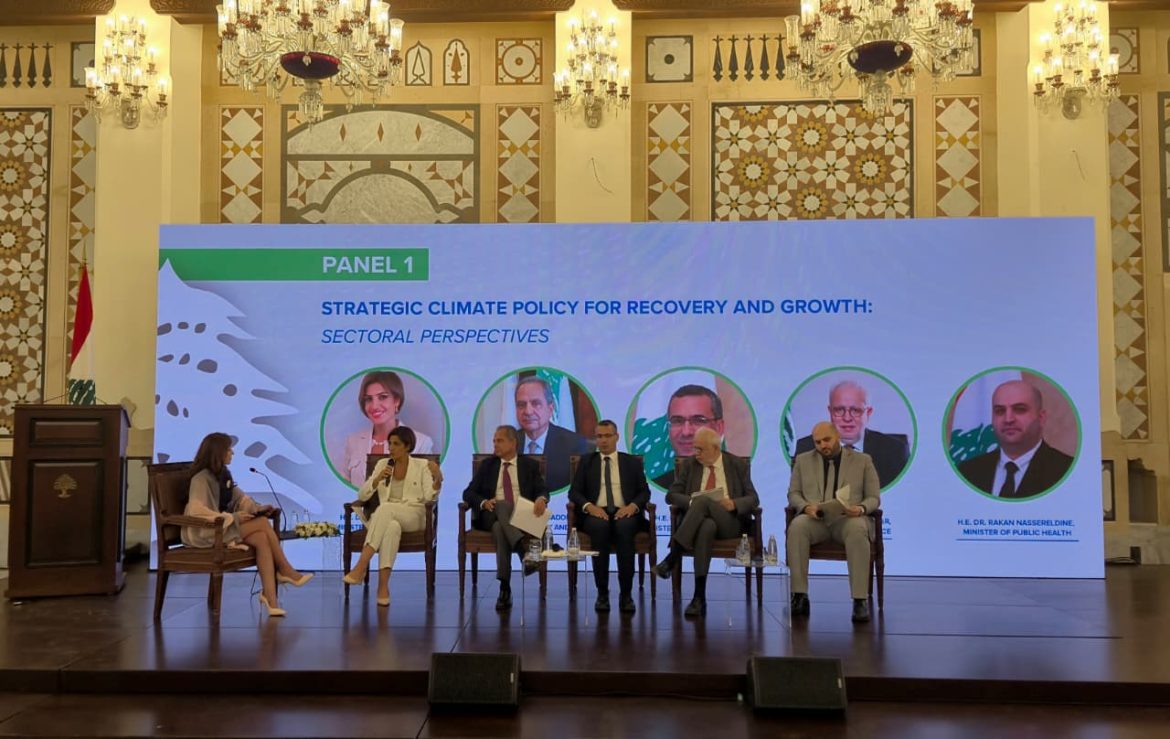Beirut, Lebanon, 23 September 2025 – The Ministry of Environment today, launched its landmark Climate Policy Package at the Grand Serail under the patronage of the President of the Council of Ministers H.E. Mr. Nawaf Salam, with support from the United Nations Development Programme (UNDP). The package brings together three national strategies, the National Adaptation Plan (NAP 2025–2035), the updated Nationally Determined Contribution (NDC 3.0), and the Long-Term Low Emission Development Strategy (LT-LEDS).
Together, they provide Lebanon with its most comprehensive climate roadmap to date—charting a path to reduce emissions, expand renewable energy, and strengthen resilience to climate shocks.
The launch brought together government officials, international partners, and civil society representatives. Among them were H.E Mr. Nawaf Salam; President of the Council of Ministers, H.E. Dr. Tamara Elzein, Minister of Environment; Ms. Sandra De Waele, EU Ambassador to Lebanon; Mr. Tarcísio Costa, Ambassador of Brazil to Lebanon; Mr. Imran Riza, UN Resident Coordinator; and Ms. Blerta Aliko, UNDP Resident Representative. Their broad participation underscored Lebanon’s renewed commitment to accelerate climate action, advance its recovery agenda, and reaffirm its Paris Agreement obligations under the UNFCCC.
In his remarks, President of the Council of Ministers, H.E. Mr. Nawaf Salam, said: “Climate change, for us, is a lived reality. Every Lebanese has felt it. We have seen droughts spread further across the country. We have watched our water reservoirs diminish. We have seen winters grow shorter, snow retreat, and floods in spring and autumn sweep through our valleys.
Climate change is already reshaping our lives, our economy, and our security. This is why climate is not a peripheral but a central matter for us.”
In her address, Minister of Environment Tamara El Zein stated, “Reflecting the Ministerial Declaration, in which the Government affirmed that ‘we want a State that confronts the risks of climate disruption and natural disasters, and, within the framework of reconstruction, we want a State that adopts more sustainable recovery plans, I’m pleased to announce the completion of an updated institutional vision that incorporates a dedicated Climate Change Directorate—transforming the Ministry into the Ministry of Environment and Climate.”
Lebanon contributes minimally to global emissions yet ranks among the most climate-vulnerable countries. Climate impacts already cost an estimated 5% of GDP annually, with losses projected to rise to 32% by 2080 if left unchecked. In 2023 alone, heat stress caused USD 1.3 billion in productivity losses, affecting more than 110,000 jobs in agriculture, construction, and services.
The package responds directly to these challenges, turning climate risk into an opportunity for resilience and growth.
UNDP Resident Representative Ms. Blerta Aliko stated: “With scientific evidence clear and solutions available, UNDP emphasizes a collective obligation to act now to avoid profound negative impacts for generations to come,” adding that “a sustainable development plan for Lebanon that invests in the transition to clean energy, durable food systems, and other key sectors is critical to reducing emissions and ensuring inclusive green growth for all the people of Lebanon.”
To turn these strategies into action, the Government is prioritizing the adoption of a new Climate Change Law to strengthen governance and is positioning the Lebanon Green Investment Facility (LGIF) as the central vehicle to mobilize climate finance. These measures will reduce risks for investors, unlock financing for clean energy and green infrastructure, and ensure that climate action delivers tangible benefits for people and communities.
Projections show that every USD 1 invested could generate over USD 5 in returns, demonstrating the economic potential of climate-driven reforms.
Following the launch, two ministerial and stakeholder roundtables were also held at the Grand Serail. Discussions focused on mainstreaming climate action across ministries, introducing the proposed Climate Change Law, and expanding investment opportunities in renewable energy, sustainable transport, and green infrastructure.
Background:
Since 1999, The United Nations Development Programme (UNDP) in Lebanon plays a significant role in addressing climate change through projects that promote sustainable energy, mitigate greenhouse gas emissions, and enhance climate resilience. This is done in close collaboration with the Lebanese government, especially the Ministry of Environment, to align national development with global climate goals.

